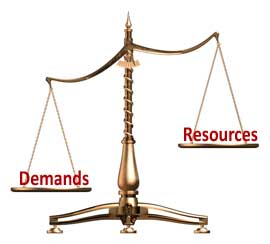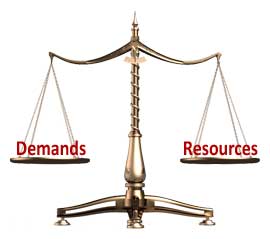
Stress is not always a bad thing. It can save your life in an emergency by giving you the energy to act quickly to fight or flee. Stress can help you focus. A deadline can motivate you to work at peak efficiency.Some people do their best work under pressure.
Our bodies were meant to respond well to short-term stresses.Unfortunately, there are many stresses associated with caregiving and often these are long-term in nature. Therefore, caregivers need effective ways to cope with and manage stress, both for themselves and those they care for.
This module discusses caregiver stress, its signs and coping strategies. People with chronic disabilities are also commonly under stress and may show similar signs of its effects. Caregiver strategies for helping someone with a chronic disability manage stress are found in Modules B and C.
 Stress is the individual’s psychological,
physiological and behavioural response to a perceived lack of balance between the demands placed upon them and their ability to meet those demands. The stress or may be external (e.g.,demands of caregiving or inadequate finances) or
internal (e.g., one’s own health status or negative feelings). Over time, unmanaged stress can lead to ill-health and burnout.
Stress is the individual’s psychological,
physiological and behavioural response to a perceived lack of balance between the demands placed upon them and their ability to meet those demands. The stress or may be external (e.g.,demands of caregiving or inadequate finances) or
internal (e.g., one’s own health status or negative feelings). Over time, unmanaged stress can lead to ill-health and burnout.
 Coping is a response aimed
at reducing the physical,emotional and/or psychological burden linked to stressors. Strategies that work for one person may not work for another. Likewise, a strategy may work for someone in one set of circumstances, but not another.
What works seems to depend on personality traits, what has worked in the past,the number of stressors and the impact or personal meaning of a new stressor.
Coping is a response aimed
at reducing the physical,emotional and/or psychological burden linked to stressors. Strategies that work for one person may not work for another. Likewise, a strategy may work for someone in one set of circumstances, but not another.
What works seems to depend on personality traits, what has worked in the past,the number of stressors and the impact or personal meaning of a new stressor.
The goal of coping strategies is to bring demands and resources back into balance. This may be done in two ways - by decreasing the demands or by increasing the resources available. You can decrease the demands of caregiving by obtaining needed information and finding more effective ways to address the needs of your loved one with a chronic disability. You can increase the resources available by taking care of yourself and practising other stress management techniques.
Coping becomes more difficult after trauma, especially when it leads to questioning basic beliefs about life’s fairness and one’s own worthiness (e.g., “Why me?”). Coping is also more difficult when the stress is chronic. Multiple and interacting stressors are the rule, rather than the exception, when dealing with chronic disability. Therefore, it is important to be (or become) resilient to life’s ups and downs.

Have you ever had people say to you, “I don’t know how you can manage. You are amazing. I know I couldn’t do it.” But then you realize you are managing - more or less. Yes, you may feel overwhelmed, exhausted or frustrated on occasion, but you are making it. You keep going and moving forward. What is it that enables you to survive in the midst of uncertainty? It is called resiliency.
Resiliency is the ability to bounce back from adversity. People vary in their level of resiliency and these differences are visible from childhood. Resiliency is the reason why some children exposed to poverty, inadequate parenting and other difficult living circumstances grow up to be model citizens, while their playmates or siblings become drug users or gang members. Despite the natural advantages or disadvantages that people have in their environment, resiliency can be developed by practising certain actions and attitudes.